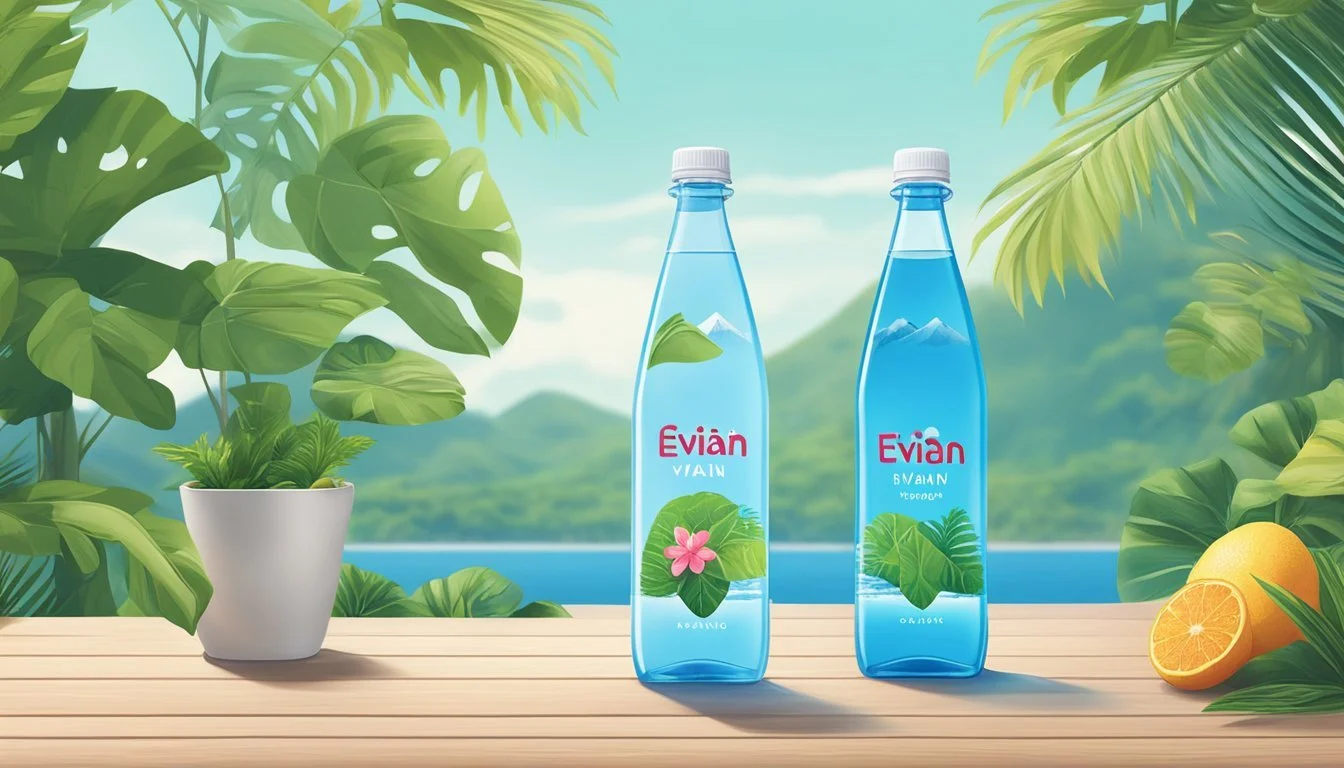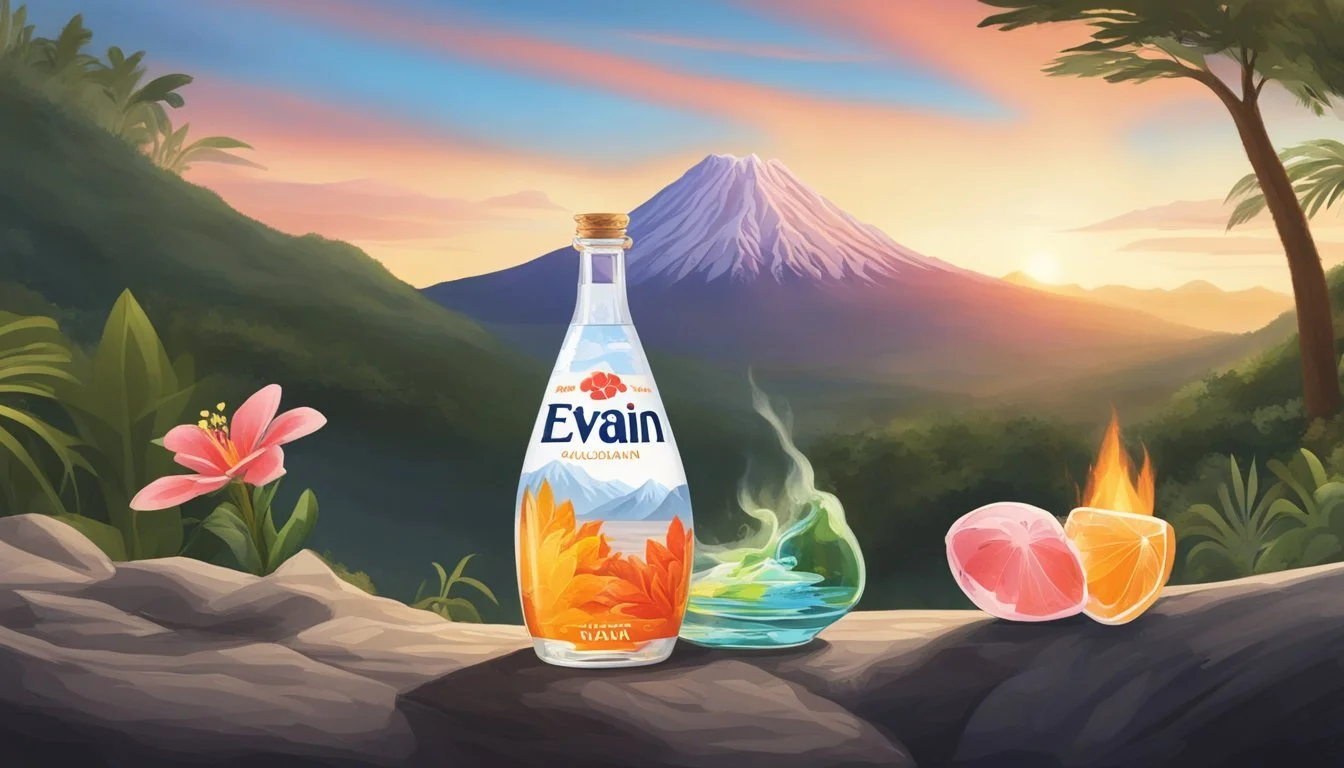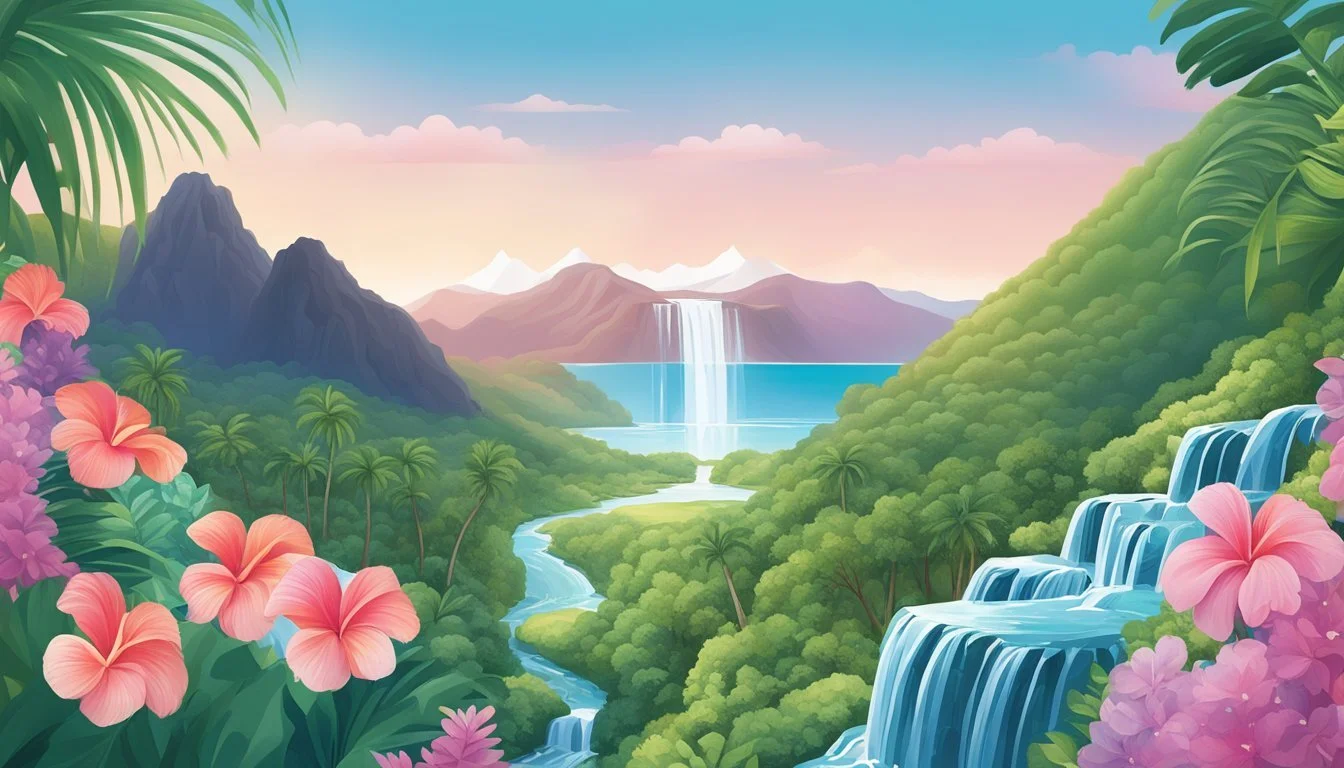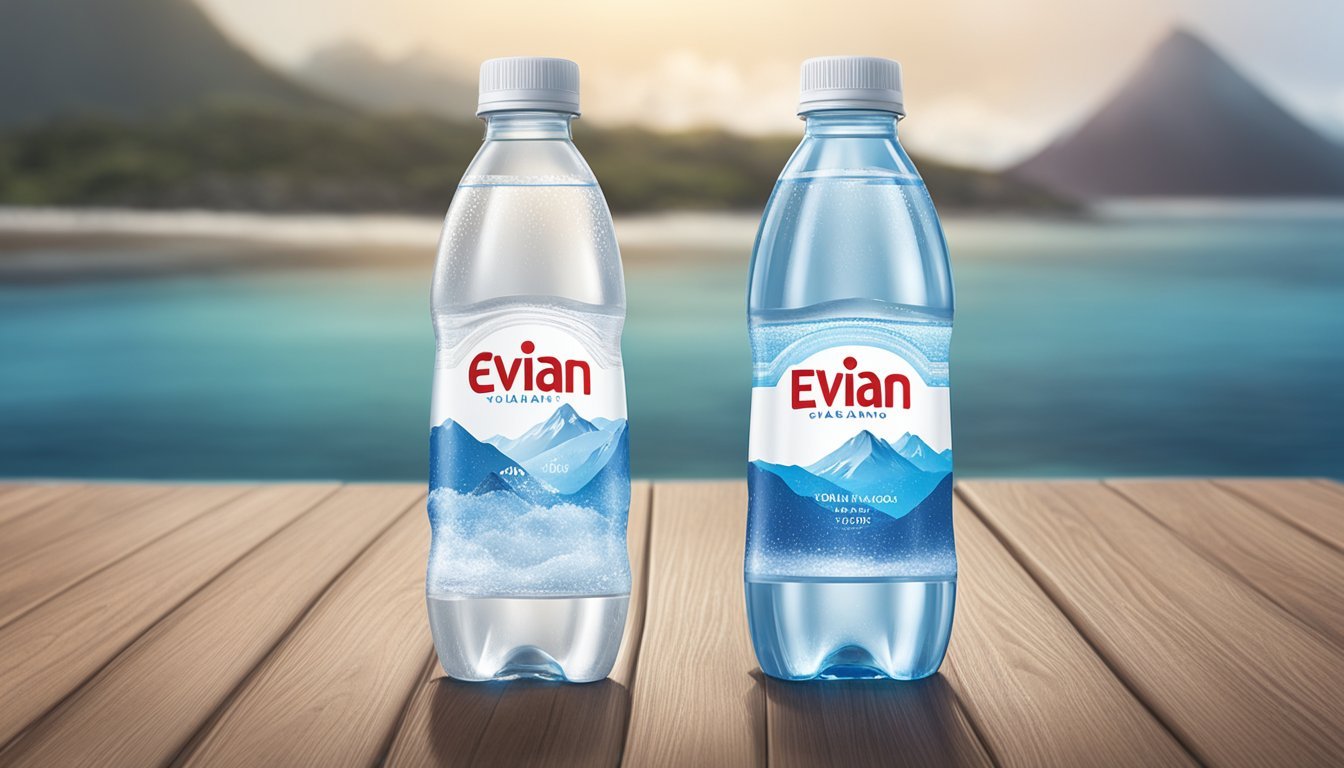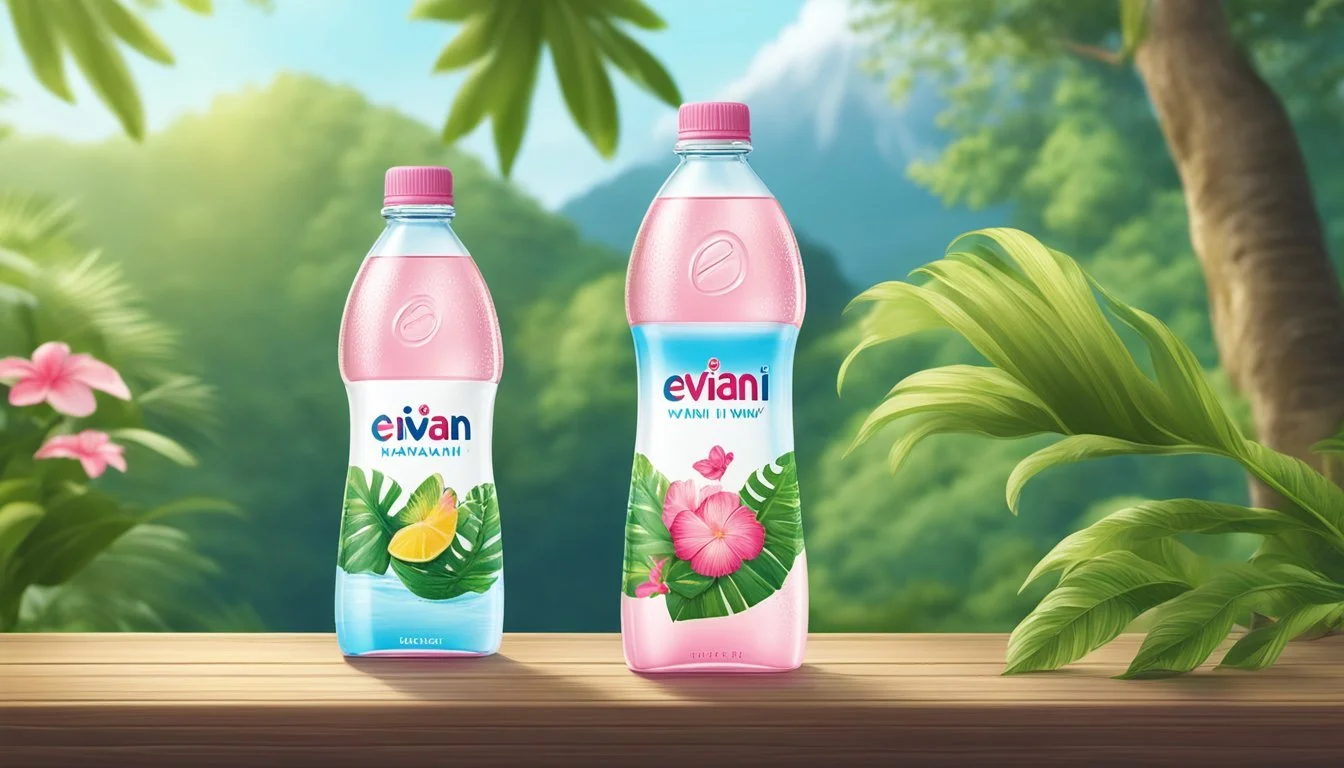Evian vs. Hawai’i Volcanic
A Detailed Comparison of Premium Bottled Waters
When it comes to choosing the best bottled water, the competition between Evian and Hawai’i Volcanic is intense. Both brands promise premium quality and refreshing taste, but which one stands out? Evian is celebrated for its high calcium and magnesium content, delivering a refreshing and crisp flavor profile that many consumers love.
Hawai’i Volcanic, on the other hand, boasts a unique mineral composition and pristine purity sourced from the volcanic mountains of Hawai’i. The distinct taste of Hawai’i Volcanic is attributed to the natural filtration process through volcanic rock, which adds a subtle yet intriguing flavor dimension.
Both bottled waters offer something unique, and the choice ultimately comes down to personal preference. Whether you value the smooth, mineral-rich taste of Evian or the exotic, lightly mineralized flavor of Hawai’i Volcanic, there’s no denying the appeal of these two titans in the bottled water market.
Origin and Source
Evian is sourced from the French Alps, specifically in Évian-les-Bains, France. The water originates from natural springs that are fed by rain and snowmelt. This process takes approximately 15 years, allowing the water to filter through glacial sand and acquire its unique mineral profile.
Hawai'i Volcanic water, by contrast, is collected from the Big Island of Hawaii. Sourced from the Mauna Loa volcano, this water is filtered through porous volcanic rock, resulting in a distinct mineral composition. The water is collected from deep wells and natural springs near Hilo.
Key Details
Brand Origin Location Source Type Evian France Natural Spring Water Hawai'i Volcanic Hawaii, USA Volcanic Water
Evian water's glacial journey endows it with a slightly alkaline pH level. Hawai'i Volcanic water benefits from volcanic filtration, resulting in an artesian and mineral-rich profile.
Evian's source in the Alps is globally recognized for its purity. Hawai'i Volcanic capitalizes on the natural filtration of volcanic rock, a feature unique to the Big Island's Mauna Loa region.
Both brands pride themselves on their natural origins, but they differ significantly in terms of geological influences and filtration methods.
Chemical Composition and Health Benefits
Evian and Hawai’i Volcanic offer distinct chemical compositions, impacting the health benefits each provides through their unique mineral content, pH levels, and electrolytes.
Mineral Content Analysis
Evian water comes from a spring in the French Alps, featuring a balanced mineral composition including calcium, magnesium, and silica. These minerals contribute to bone health and can support overall metabolic functions. Specifically, Evian contains approximately 80 mg/L of calcium and 26 mg/L of magnesium.
Hawai’i Volcanic, sourced from Hawaiian volcanic regions, boasts a distinct mineral profile with high levels of potassium and sodium. The potassium concentration helps maintain electrolyte balance, which is crucial for athletes. Both water types provide different mineral benefits catering to varied dietary needs.
pH and Alkalinity
Evian features a neutral pH of around 7.2, which is gentle on the body's system. This neutrality makes it suitable for daily hydration without altering the body's natural pH balance.
Hawai’i Volcanic is known for its alkaline pH, typically around 8.0. This higher alkalinity can help neutralize acid in the bloodstream, potentially benefiting those with acid-related conditions. Alkaline water is often sought after for its purported benefits like reduced acid reflux and balanced pH levels.
Electrolytes and Hydration
Evian provides a moderate level of natural electrolytes, which assist in maintaining hydration and muscle function. The balance of minerals in Evian supports consistent hydration, making it a go-to choice for everyday consumption.
Hawai’i Volcanic, enriched with electrolytes like potassium and sodium, aims to optimize hydration. These electrolytes are vital for restoring fluids, especially after intense physical activities. This makes Hawai’i Volcanic particularly appealing to athletes and individuals with high physical demands.
Both Evian and Hawai’i Volcanic offer substantial health benefits, reflected through their unique chemical compositions and the specific needs they cater to.
Environmental Impact and Sustainability
Examining the sustainability efforts of Evian and Hawai’i Volcanic Water reveals essential differences in their environmental footprint. Key aspects include each brand's approach to water sourcing and their bottling and packaging practices.
Water Sourcing and Ecosystem
Evian sources its water from the Cachat Spring in the French Alps. This source is renowned for its purity, stemming from one of the purest environments where the water undergoes a natural filtration process over 15 years through glacial sand.
In contrast, Hawai’i Volcanic Water taps into rainfall filtered through thousands of feet of porous lava rock, located in bio-diverse forest preserves. This process naturally contributes to the water's mineral content and alkalinity. The sustainable approach ensures that less than 0.003% of the annually collected water is extracted, minimizing the environmental impact on the delicate ecosystem.
Bottling and Packaging
Evian primarily uses rPET (100% recycled plastic) in its bottles, aiming to reduce plastic waste. They emphasize recycling and the use of sustainable packaging materials to lessen their carbon footprint.
Hawai’i Volcanic Water goes further by incorporating 100% recycled plastic (rPET) and promoting the Kōkua Initiative, which focuses on environmental conservation efforts. Their packaging processes reflect a commitment to sustainability, with efforts to use the most eco-friendly materials available. Additionally, a portion of their profits supports clean water access projects in Malawi, reinforcing their dedication to environmental and social responsibilities.
Taste Profile
Evian and Hawai’i Volcanic offer distinct taste experiences shaped by their unique sources and mineral compositions. The following is a breakdown of their respective flavors.
Evian's Palate
Evian is known for its smooth and refreshing taste. Originating from the French Alps, its water undergoes a natural filtration process through glacial sand, which contributes to its clean flavor.
The mineral content in Evian includes higher levels of calcium and magnesium. This contributes to a subtle yet crisp texture. The prominence of these minerals often results in a slightly alkaline taste.
Evian’s soft and neutral profile makes it a favorite among those seeking a light, non-intrusive water experience. Whether consumed alone or paired with a meal, it offers pure, natural hydration without overpowering the palate.
Hawai’i Volcanic's Flavor
Hawai’i Volcanic offers a distinct taste profile influenced by the volcanic rocks it filters through in Hawaii. This unique source provides a mineral composition that includes silica, calcium, magnesium, and electrolytes.
The result is a slightly sweet and smooth flavor that is both refreshing and invigorating. The balanced mineral content gives the water a crisp, clean mouthfeel, setting it apart from other brands.
Hawai’i Volcanic is often praised for its light yet revitalizing taste, appealing to those who enjoy a pure and elegant hydration experience. Its unique character makes it suitable for both casual sipping and accompanying fine dining, enhancing its universal appeal.
Variants and Options
When considering bottled water options, it is important to evaluate the variants available and the range of products each brand offers. Here, we compare the offerings of Evian and Hawai’i Volcanic, focusing on both still and sparkling options as well as the product range.
Still vs. Sparkling
Evian offers still water sourced from the French Alps. This water is celebrated for its natural filtration process through glacial sand and a balanced pH level of 7.07.
Hawai’i Volcanic provides still and sparkling water. The still variant is naturally alkaline with minerals from volcanic rock, while the sparkling water undergoes carbonation post-extraction, adding a fizzy texture without altering its purity.
Brand Still Water Sparkling Water Evian Yes No Hawai’i Volcanic Yes Yes
Product Range
Evian's product range includes various bottle sizes from 330 ml to 1.5 liters, catering to different consumer needs. Their packaging includes both plastic and glass bottles, emphasizing sustainability.
Hawai’i Volcanic offers an extensive product lineup. Alongside traditional bottled water, they also produce flavored variants infused with natural extracts. The range includes small personal bottles to larger family-sized containers, addressing a wide array of preferences.
Both brands are committed to eco-friendly practices. Evian incorporates recycled plastic in their bottling process, while Hawai’i Volcanic focuses on minimal packaging and renewable resources.
Health and Safety Standards
Purity is a key factor in bottled water quality. Evian prides itself on being derived from pristine sources in the French Alps. It undergoes a natural filtration process through glacial sand, ensuring its purity. Hawai’i Volcanic, sourced from Hawaiian volcanic rocks, emphasizes its clean water through natural volcanic filtration.
Both brands highlight the absence of contaminants. For Evian, some recent reports raised concerns about the presence of pesticides. Regular testing is conducted to maintain safety standards. Hawai’i Volcanic undertakes rigorous testing to ensure contaminants like heavy metals and microplastics stay below detectable levels.
Health benefits are often linked to the mineral content in bottled water. Evian's mineral profile includes calcium and magnesium, beneficial for health. Hawai’i Volcanic emphasizes its naturally alkaline water, which some believe can aid in hydration and overall bodily functions.
Drinking water safety standards are upheld through strict regulatory compliance. Both brands adhere to internationally recognized standards, including those set by the World Health Organization (WHO). Regular audits and quality checks help maintain these standards.
In summary, both Evian and Hawai’i Volcanic strive to provide high-quality, pure, and safe bottled water through stringent health and safety standards.
Economic Considerations
When comparing Evian and Hawai’i Volcanic water, key factors like cost and affordability, as well as availability and accessibility, play crucial roles. Consumers need to consider these aspects carefully to make an informed choice.
Cost and Affordability
The cost of bottled water is a significant concern for most consumers. Evian is typically found at a higher price point due to its premium branding and origin from the French Alps. Hawai’i Volcanic water, sourced from Hawaiian volcanic springs, also positions itself as a premium product, often resulting in similar or slightly higher pricing.
At Whole Foods Market, both brands are available, but occasionally there are offers and discounts, which can make them more affordable. Consumers may find that Hawai’i Volcanic offers less frequent price reductions compared to Evian. Based on a survey of major retailers, a liter of Evian costs approximately $2.00-$2.50, while Hawai’i Volcanic can range between $2.50-$3.00 per liter.
Availability and Accessibility
Availability is another crucial factor. Evian has a robust global distribution network, making it accessible in supermarkets, convenience stores, and online platforms across many countries. It is a staple in places like Whole Foods Market, ensuring consumers can easily purchase it.
Hawai’i Volcanic, on the other hand, has a more limited distribution. While it is available in select high-end stores and online, it might not be as easily found in local supermarkets. The brand focuses on niche markets and eco-friendly outlets. Accessibility may be a challenge for those outside urban areas or regions where health-centric retailers like Whole Foods Market are less common.
This disparity in distribution can affect the convenience of purchasing Hawai’i Volcanic water compared to Evian, which is more widely distributed and often more readily available.
Company Initiatives and Social Responsibility
Evian and Hawai’i Volcanic Water both emphasize social responsibility and sustainability in their operations.
Evian commits to preserving nature and limiting packaging waste. They actively promote recycling and have introduced environmentally friendly packaging. Their efforts include partnerships with organizations like Pump Aid to provide clean water in Africa, aiming to improve health and reduce water-related emissions.
Hawai’i Volcanic Water focuses on sustainability by sourcing water naturally through lava filtration. They highlight the enrichment of their water with Mana, which signifies life energy. Their sustainability measures are reinforced by eco-friendly packaging and a dedication to maintaining low emissions throughout the process.
Both companies also promote good health. Evian is associated with healthy purity, contributing positively to the Recommended Daily Intake (RDI) of essential minerals. Hawai’i Volcanic Water, on the other hand, emphasizes the natural alkalinity and mineral content in its water, enhancing the overall drinking experience.
Key Initiatives:Evian:
Environmental responsibility and recycling promotion
Clean water projects in Africa
Packaging waste reduction
Hawai’i Volcanic Water:
Sustainable sourcing and lava filtration
Emphasis on Mana and natural alkalinity
Eco-friendly packaging and low emissions
By focusing on these initiatives, both brands are striving to make a positive impact on the environment and society, aligning their operations with broader goals of sustainability and health.
Consumer Engagement and Services
Evian offers multiple avenues for consumer engagement. They have a subscription service that ensures regular delivery to your doorstep. Customers can manage their subscriptions via the Evian website, which also offers exclusive discounts and promotions.
Evian's customer service team can be contacted via phone or email for any inquiries or issues. Additionally, Evian is available at Whole Foods Market, making it easy for consumers to find the product.
Hawai’i Volcanic also provides a subscription service, simplifying the process for customers who want regular shipments. They emphasize eco-friendly shipping practices and their customer service is accessible through phone and email. Special offers are frequently available to subscribers, adding value to their engagement with the brand.
Both brands prioritize exceptional consumer experiences, offering reliable and responsive customer service channels.
Consumers can choose between these brands based on factors like subscription flexibility, shipping options, and accessibility at retail locations like Whole Foods Market.
Final Assessment and Recommendations
When comparing Evian and Hawai’i Volcanic bottled water, several factors come into play: taste, convenience, cost, health benefits, sustainability, and purity.
Taste: Evian has a smooth and balanced flavor profile. Hawai’i Volcanic offers a slightly sweet and soft taste, attributed to its natural filtration through lava.
Convenience: Both brands are widely available at various retailers and online.
Cost: Hawai’i Volcanic water is generally more expensive, reflecting its premium status. Evian is more moderately priced.
Health Benefits: Evian's pH level of 7.07 is closely neutral. Hawai’i Volcanic is naturally alkaline, which may offer additional health benefits due to its higher mineral content.
Sustainability: Hawai’i Volcanic emphasizes sustainable practices, including eco-friendly packaging and responsible sourcing. Evian also focuses on sustainability but is often considered less rigorous in its approach compared to Hawai’i Volcanic.
Purity: Evian water is sourced from the French Alps and is known for its purity and mineral balance. Hawai’i Volcanic is artesian water, filtered naturally through volcanic rock, ensuring high purity and mineral content.
When choosing between Evian and Hawai’i Volcanic, consider what aspects are most important: flavor, health benefits, cost, or environmental impact. Both offer high-quality hydration options, but preferences may vary based on individual priorities.
More About Evian
Evian vs Mountain Valley Spring Water: Which Bottled Water is Better?
Evian vs Richard's Rainwater: Which Bottled Water is Better?
Evian vs Whole Foods Italian Still Mineral water: Which Bottled Water is Better?
More About Hawai’i Volcanic
Acqua Pana vs Hawaii Volcanic: Which Bottled Water is Better?
Antipodes vs Hawaii Volcanic: Which Bottled Water is Better?
Aqua Carpatica vs Hawaii Volcanic: Which Bottled Water is Better?
Arrowhead vs Hawaii Volcanic: Which Bottled Water is Better?
Boxed Water vs Hawaii Volcanic: Which Bottled Water is Better?
Castle Rock vs Hawaii Volcanic: Which Bottled Water is Better?
Core Hydration vs Hawaii Volcanic: Which Bottled Water is Better?
Deer Park vs Hawaii Volcanic: Which Bottled Water is Better?
Hawaii Volcanic vs 1907water: Which Bottled Water is Better?
Hawaii Volcanic vs Alkaline88: Which Bottled Water is Better?
Hawaii Volcanic vs Big Chill: Which Bottled Water is Better?
Hawaii Volcanic vs BodyArmor: Which Bottled Water is Better?
Hawaii Volcanic vs Cascade Mountain: Which Bottled Water is Better?
Hawaii Volcanic vs CBD Living: Which Bottled Water is Better?
Hawaii Volcanic vs Crystal Geyser: Which Bottled Water is Better?
Hawaii Volcanic vs Crystal Lake: Which Bottled Water is Better?
Hawaii Volcanic vs Essence pH10: Which Bottled Water is Better?
Hawaii Volcanic vs Kirkland Signature: Which Bottled Water is Better?
Hawaii Volcanic vs Liquid Death: Which Bottled Water is Better?
Hawaii Volcanic vs Open Water: Which Bottled Water is Better?
Hawaii Volcanic vs Proud Source: Which Bottled Water is Better?
Hawaii Volcanic vs Pure Life: Which Bottled Water is Better?
Hawaii Volcanic vs Purely Sedona: Which Bottled Water is Better?
Hawaii Volcanic vs Richard's Rainwater: Which Bottled Water is Better?
Hawaii Volcanic vs Simple Truth: Which Bottled Water is Better?
Hawaii Volcanic vs Talking Rain AQA: Which Bottled Water is Better?
Hawaii Volcanic vs Weird Water: Which Bottled Water is Better?
Hawaii Volcanic vs Whole Foods 365: Which Bottled Water is Better?
Hawaii Volcanic vs Whole Foods Italian Still Mineral water: Which Bottled Water is Better?
Hawaiian Springs vs Hawaii Volcanic: Which Bottled Water is Better?
Ice Mountain vs Hawaii Volcanic: Which Bottled Water is Better?
Icelandic Glacial vs Hawaii Volcanic: Which Bottled Water is Better?
Just Water vs Hawaii Volcanic: Which Bottled Water is Better?
Mountain Valley Spring Water vs Hawaii Volcanic: Which Bottled Water is Better?
Nestle Pure Life vs Hawaii Volcanic: Which Bottled Water is Better?
Poland Spring vs Hawaii Volcanic: Which Bottled Water is Better?
San Pellegrino vs Hawaii Volcanic: Which Bottled Water is Better?
Smartwater vs Hawaii Volcanic: Which Bottled Water is Better?
Solan de Cabras vs Hawaii Volcanic: Which Bottled Water is Better?
Topo Chico vs Hawaii Volcanic: Which Bottled Water is Better?
Zephyrhills vs Hawaii Volcanic: Which Bottled Water is Better?

